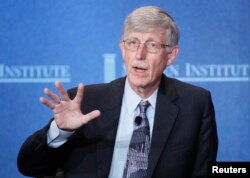Ten of the world's biggest drug companies -- normally the most competitive of rivals -- are joining with U.S. health experts in an unusual new effort to develop treatments for major diseases.
The agreement was announced Tuesday in Washington. It calls for the group to spend $230 million over the next five years as researchers look for cures for Alzheimer's disease, type 2 diabetes, and two autoimmune disorders, rheumatoid arthritis and lupus.
The drug companies collectively have spent billions of dollars over recent years as they search for new drugs, bigger profits and a competitive edge over other drugmakers.
But the director of the U.S. National Institutes of Health, Francis Collins, said the corporate do-it-alone approach has led to a high failure rate in the development of groundbreaking drugs, "while patients and their families wait." He said it can take drug companies 14 years to develop a new drug at a cost of $1 billion, yet 99 percent of research efforts fail.
Collins said the drug research "is a job too big for any one of us." He said that "now it's time to work together" to pool efforts in hopes of achieving a scientific breakthrough in the development of disease-curing drugs.
The NIH and the government's Food and Drug Administration helped form the research group, calling itself the Accelerating Medicines Partnership. It includes several private groups fighting specific diseases.
The drug companies in the research partnership include seven American firms: AbbVie, Biogen Idec, Bristol-Meyers Squibb, Johnson & Johnson, Lilly, Merck and Pfizer. Great Britain's GlaxoSmithKline is a partner, as are France's Sanofi and Japan's Takeda.
The group has agreed that it will make its research data and analysis available to the public, giving other researchers access to information they could use for further drug development studies.
The agreement was announced Tuesday in Washington. It calls for the group to spend $230 million over the next five years as researchers look for cures for Alzheimer's disease, type 2 diabetes, and two autoimmune disorders, rheumatoid arthritis and lupus.
The drug companies collectively have spent billions of dollars over recent years as they search for new drugs, bigger profits and a competitive edge over other drugmakers.
But the director of the U.S. National Institutes of Health, Francis Collins, said the corporate do-it-alone approach has led to a high failure rate in the development of groundbreaking drugs, "while patients and their families wait." He said it can take drug companies 14 years to develop a new drug at a cost of $1 billion, yet 99 percent of research efforts fail.
Collins said the drug research "is a job too big for any one of us." He said that "now it's time to work together" to pool efforts in hopes of achieving a scientific breakthrough in the development of disease-curing drugs.
The NIH and the government's Food and Drug Administration helped form the research group, calling itself the Accelerating Medicines Partnership. It includes several private groups fighting specific diseases.
The drug companies in the research partnership include seven American firms: AbbVie, Biogen Idec, Bristol-Meyers Squibb, Johnson & Johnson, Lilly, Merck and Pfizer. Great Britain's GlaxoSmithKline is a partner, as are France's Sanofi and Japan's Takeda.
The group has agreed that it will make its research data and analysis available to the public, giving other researchers access to information they could use for further drug development studies.





